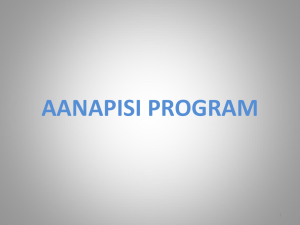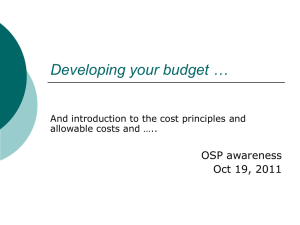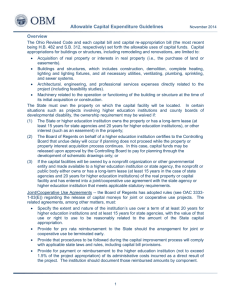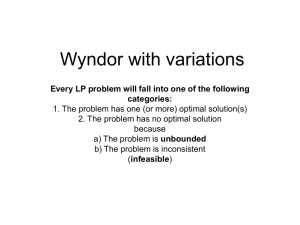Cost Allowability List
advertisement
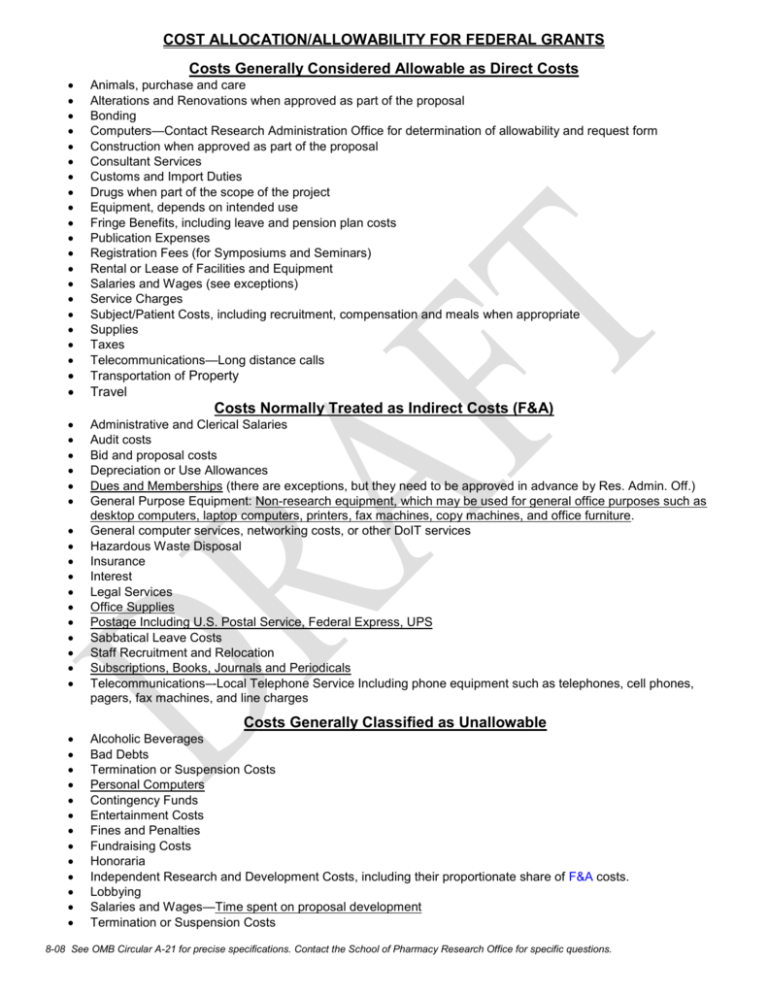
COST ALLOCATION/ALLOWABILITY FOR FEDERAL GRANTS Costs Generally Considered Allowable as Direct Costs Animals, purchase and care Alterations and Renovations when approved as part of the proposal Bonding Computers—Contact Research Administration Office for determination of allowability and request form Construction when approved as part of the proposal Consultant Services Customs and Import Duties Drugs when part of the scope of the project Equipment, depends on intended use Fringe Benefits, including leave and pension plan costs Publication Expenses Registration Fees (for Symposiums and Seminars) Rental or Lease of Facilities and Equipment Salaries and Wages (see exceptions) Service Charges Subject/Patient Costs, including recruitment, compensation and meals when appropriate Supplies Taxes Telecommunications—Long distance calls Transportation of Property Travel Costs Normally Treated as Indirect Costs (F&A) Administrative and Clerical Salaries Audit costs Bid and proposal costs Depreciation or Use Allowances Dues and Memberships (there are exceptions, but they need to be approved in advance by Res. Admin. Off.) General Purpose Equipment: Non-research equipment, which may be used for general office purposes such as desktop computers, laptop computers, printers, fax machines, copy machines, and office furniture. General computer services, networking costs, or other DoIT services Hazardous Waste Disposal Insurance Interest Legal Services Office Supplies Postage Including U.S. Postal Service, Federal Express, UPS Sabbatical Leave Costs Staff Recruitment and Relocation Subscriptions, Books, Journals and Periodicals Telecommunications–-Local Telephone Service Including phone equipment such as telephones, cell phones, pagers, fax machines, and line charges Costs Generally Classified as Unallowable Alcoholic Beverages Bad Debts Termination or Suspension Costs Personal Computers Contingency Funds Entertainment Costs Fines and Penalties Fundraising Costs Honoraria Independent Research and Development Costs, including their proportionate share of F&A costs. Lobbying Salaries and Wages—Time spent on proposal development Termination or Suspension Costs 8-08 See OMB Circular A-21 for precise specifications. Contact the School of Pharmacy Research Office for specific questions. Additional Detail information on specific costs: Advertising: Allowable only for recruitment of staff or trainees, procurement of goods and services, disposal of scrap or surplus materials, and other specific purposes necessary to meet the requirements of the grant-supported project or activity. Alcoholic Beverages: Unallowable as an entertainment expense, but allowable if within the scope of an approved research project. Alteration and Renovation: Allowable with restrictions. Animals: Allowable for the acquisition, care, and use of experimental animals. Audiovisual Activities: Allowable for the production of an audiovisual. Audit Costs: Allowable may be considered a direct cost when the audit's scope is limited to a single NIH grant-supported project or program; otherwise, charges for audits should be treated as F&A costs. Bad Debts: Unallowable. Bid and Proposal Costs: Allowable as an F&A cost. Bonding: Allowable. Books and Journals: Allowable. If an organization has a library, books and journals should generally be provided as part of normal library services and treated as F&A costs rather than being directly charged. Communications: Such costs include local and long-distance telephone calls, telephone surveys, telegrams, and postage, and are usually treated as F&A costs. Telecommunications Costs: Long distance phone calls are normally treated as direct costs. Local phone service and phone equipment are normally treated as F&A costs by UW-Madison. Computers: Personal use computers unallowable. General computer services, networking costs, or other DoIT services should normally be treated as F&A costs. NOTE: Networking costs for the vast majority of Principal Investigators would NOT be allowable in that their role is NOT fully dedicated 100% to any one specific award. Exceptions: a desktop computer might be necessary, dedicated and justifiable for a project that requires large amounts of statistical or data analysis. Contact Research Admin. Office. Consortium Agreements/Contracts under Grants: Allowable to carry out a portion of the programmatic effort or for the acquisition of routine goods or services under the grant. Construction: Allowable only when program legislation specifically authorizes new construction, modernization. Consultant Services: Allowable. Contingency Funds: Unallowable. Customs and Import Duties: Allowable under grants to domestic organizations when performance will take place entirely within the United States, its possessions, or its territories, or when foreign involvement in the project is incidental to the overall grant-supported project. Charges may include consular fees, customs surtaxes, value-added taxes, and other related charges. Depreciation or Use Allowances: Such costs are usually treated as F&A costs. Donor Costs: Allowable for payment to volunteers or research subjects who contribute blood, urine samples, and other body fluids or tissues that are specifically project-related. Drugs: Allowable if within the scope of an approved research project. Dues or Membership Fees: Allowable as an F&A cost for organizational membership in business, professional, or technical organizations or societies. It may be appropriate to charge such costs to a Federal award under the following circumstances: A investigator will attend a specific meeting or conference to present finds of their research under a specific award. The registration costs to attend include membership fees. A non-member option of attendance is more costly than the registration including membership. CONFIRM WITH THE RESEARCH OFFICE IN ADVANCE. The RFP under which application was made requires investigator attendance at a specific meeting. Meeting attendance requires the individual to hold a current membership. CONFIRM WITH THE RESEARCH OFFICE IN ADVANCE. Entertainment Costs: Unallowable. This includes the cost of amusements, social activities, and related incidental costs. Equipment: Allowable for purchase of new, used, or replacement equipment as a direct cost or as part of F&A costs, depending on the intended use of the equipment. Fines and Penalties: Unallowable. Fringe Benefits: Allowable as part of overall compensation to employees in proportion to the amount of time or effort employees devote to the grant-supported project. Fundraising Costs: Unallowable. General Purpose Equipment: General purpose equipment such as desktop computers, laptop computers, printers, office furniture and vehicles are normally treated as F&A costs. Hazardous Waste Disposal: Usually treated as an F&A cost. Honoraria: Unallowable when the primary intent is to confer distinction on, or to symbolize respect, esteem, or admiration for, the recipient of the honorarium. A payment for services rendered, such as a speaker's fee under a conference grant, is allowable. Independent Research and Development Costs: Unallowable, including their proportionate share of F&A costs. Insurance: Insurance is usually treated as an F&A cost. Interest: Allowable as an F&A cost for certain assets as specified in the applicable cost principles. Leave: Allowable for employees as an employee fringe benefit. 8-08 See OMB Circular A-21 for precise specifications. Contact the School of Pharmacy Research Office for specific questions. Legal Services: Generally treated as an F&A. Library Services: General library support is not allowable as a direct cost, but may be included in the grantee's F&A pool. Lobbying: Generally unallowable. Meals: Allowable for subjects and patients under study only. Pension Plan Costs: Allowable. Postage: Postage costs which include U.S. Postal Service, Federal Express, and UPS should normally be treated as F&A. cost of sending the proposal, revisions, periodic or annual reports, or related correspondence to the funding agency should not be charged as direct costs to a sponsored project. Preaward (Preagreement) Costs: Allowable. A grantee may, at its own risk and without NIH prior approval, incur obligations and expenditures to cover costs up to 90 days prior to the effective date of a new or competing continuation award. Public Relations Costs: Allowable only for costs specifically required by the award, or for costs of communicating with the public and the press about specific activities or accomplishments under the grant-supported project or other appropriate matters of public concern. Such costs may be treated as either direct costs or F&A costs, if they benefit more than one sponsored agreement or if they benefit the grant and other work of the institution. Publications: Allowable. Page charges for publication in professional journals may be paid from project funds if the published paper reports work supported by the grant and the charges are levied impartially on all papers published by the journal. The costs of reprints and publishing in other media such as books, monographs, and pamphlets are also allowable. Recruitment Costs: Allowable subject to the conditions and restrictions contained in the applicable cost principles. Registration Fees (for Symposiums and Seminars): Allowable if necessary to accomplish project objectives. See Memberships. Relocation Costs: Allowable under specific circumstances. See Staff Recruitment. Rental or Lease of Facilities and Equipment: Allowable subject to the limitations. In general, the rental costs for facilities and equipment applicable to each budget period should be charged to that period. Sabbatical Leave Costs: Sabbatical leave costs may be included in a fringe benefit rate or in the organization's F&A rate. Salaries and Wages: Allowable. Compensation for personal services covers all amounts, including fringe benefits, paid currently or accrued. Charges for work performed by faculty members on NIH grants during the summer months or other periods not included in the base salary period will be determined for each faculty member at a rate not exceeding the base salary divided by the period to which the base salary relates. Compensation of Students: Tuition remission and other forms of compensation paid as, or in lieu of, wages to students (including fellows and trainees). Payments made for educational assistance (e.g., scholarships, fellowships, and student aid costs) may not be paid from NIH research grant funds even when they would appear to benefit the research project. Time spent in the development of new or revised proposals is unallowable. Service Charges: Allowable. Severance Pay: Allowable only to the extent that such payments are required by law, employer-employee agreement, etc. Staff Recruitment and Relocation: Staff Recruitment and Relocation costs should normally be treated as F&A costs. Stipends: Allowable as cost-of-living allowances for trainees and fellows only under NIH training grants and fellowships. Subject Costs: Allowable for research subjects. Subscriptions, Books, and Periodicals: Subscription, Book, and Periodical costs should normally be treated as F&A. Supplies: Allowable. Taxes: Allowable. Such costs include taxes that an organization is required to pay as they relate to employment, services, travel, rental, or purchasing for a project. Termination or Suspension Costs: Unallowable with exceptions. Trainee Costs: Allowable only under predoctoral and postdoctoral training grants. Transportation of Property: Allowable for freight, express, cartage, postage, and other transportation services relating to goods either purchased, in process, or delivered, including instances when equipment or other property is moved from one grantee to another. Travel: Allowable as a direct cost where such travel will provide direct benefit to the project. Consistent with the organization's established travel policy. Foreign travel is defined as any travel outside of Canada and the U.S. and its territories and possessions. Grantees must comply with the requirement that U.S.-flag air carriers be used by domestic grantees to the maximum extent possible when commercial air transportation is the means of travel between the U.S. and a foreign country or between foreign countries. This requirement shall not be influenced by factors of cost, convenience, or personal travel preference. Costs must be permissible under the law AND/OR costs must be permissible under terms/conditions of the award. ALLOWABILITY APPLIED TO NON-FEDERAL AWARDS The same General Principles apply. More exceptions than on the Federal side. Many Non-Federal Sponsors prohibit direct charging of certain types of costs. Bottom Line: It Depends. 8-08 See OMB Circular A-21 for precise specifications. Contact the School of Pharmacy Research Office for specific questions.
